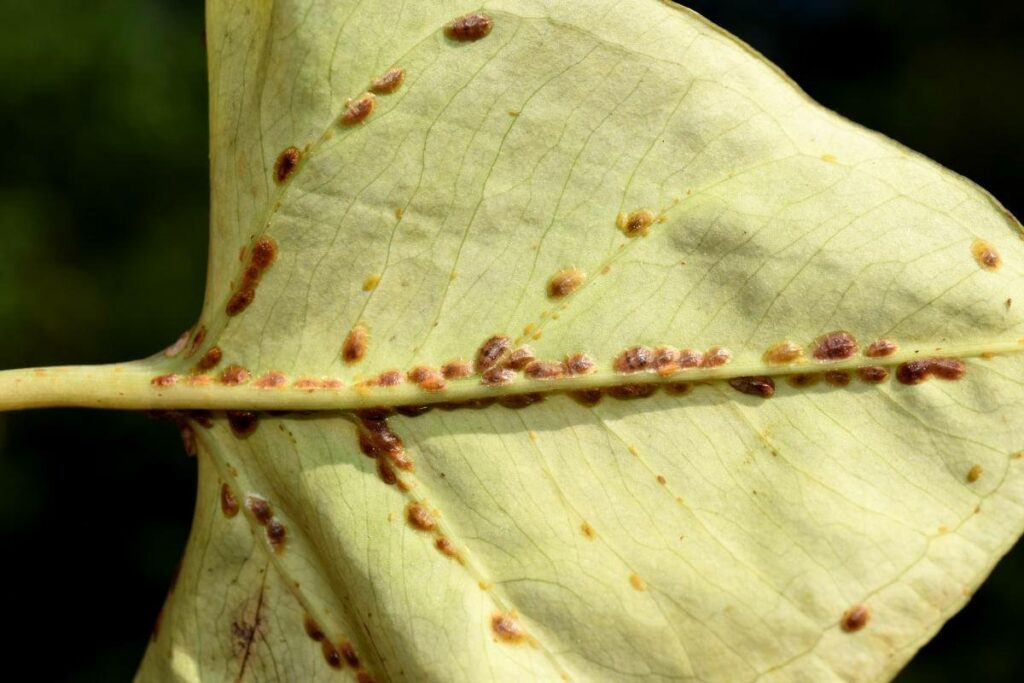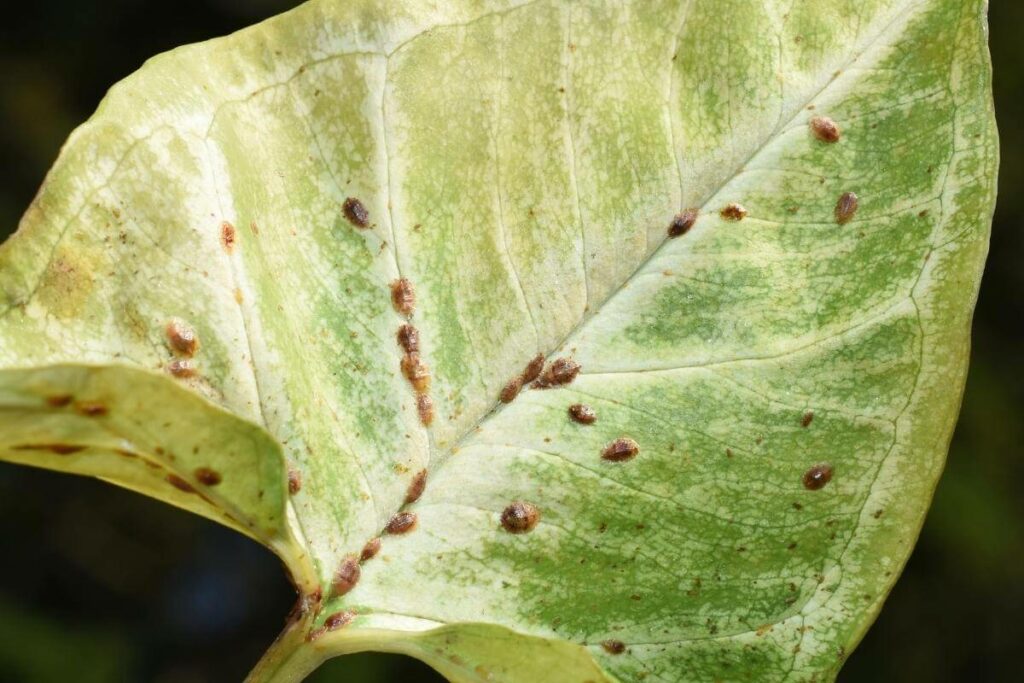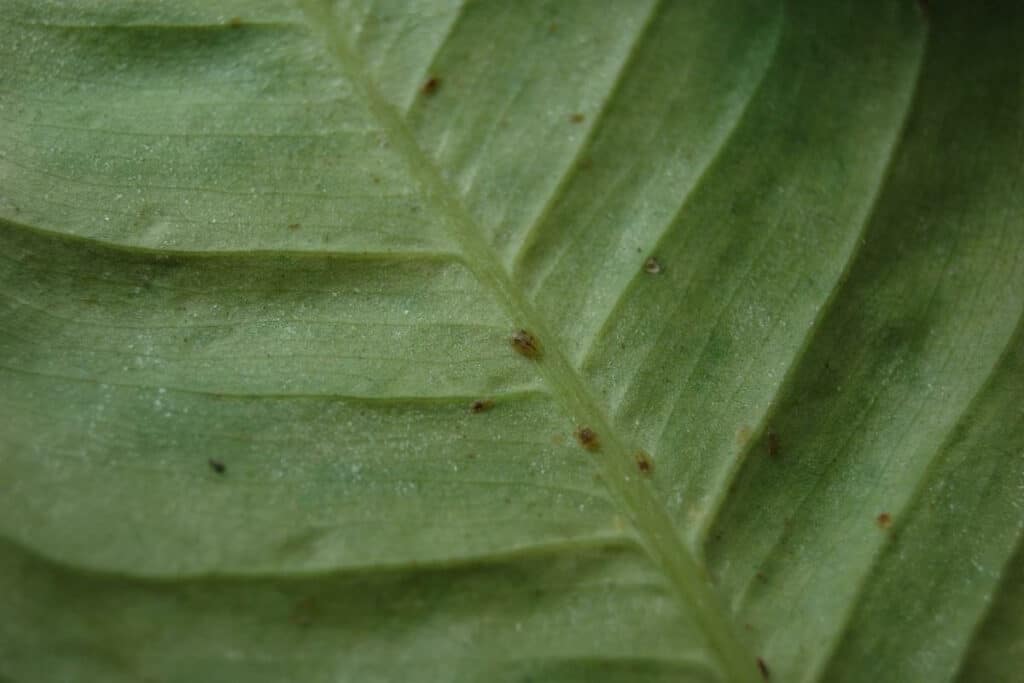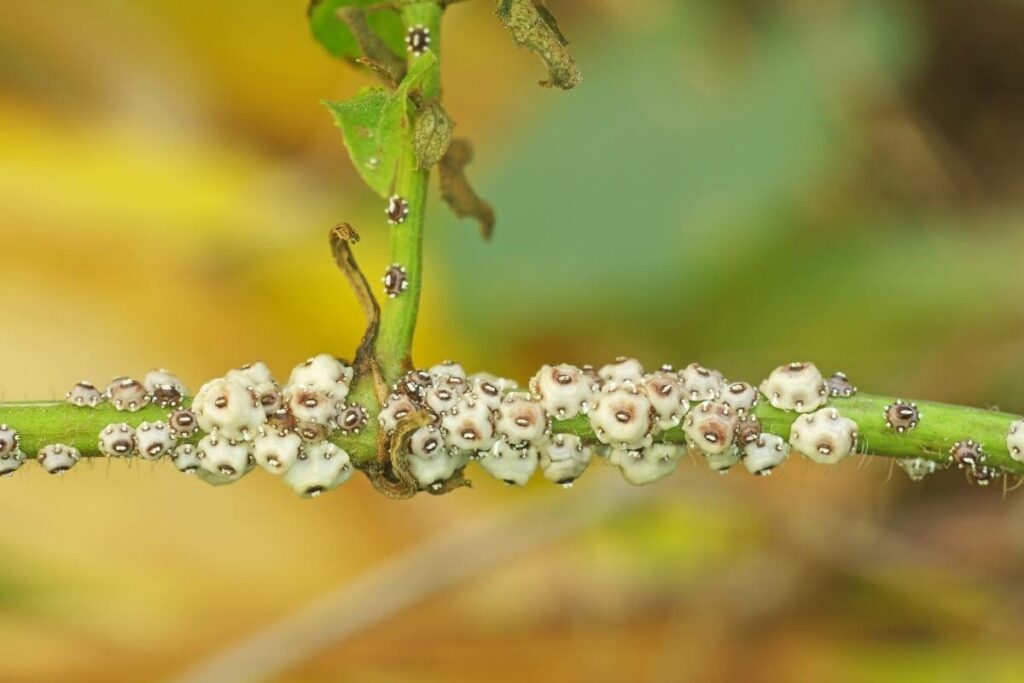Scale insects are a diverse family of soft-bodied insects that are characterized by their protective production of domed scales and waxy deposits. Scale insects are not directly harmful to humans, though they may induce allergies in susceptible individuals.
In fact, the Coccoidea family of insects have a long history of use by humans, in the production of dyes and varnishes.
They are usually encountered as a common plant pest, which is the main way in which they cause harm.
In This Article: We will explain all you need to know about scale insects, how to deal with them effectively if they are infesting your plants and prevent their return.
What Are Scale insects?

With over 8,000 species and sub-species, it can be difficult to explain exactly what scale insects are.
However, there are some features that this family of insects have in common:
- They are small, often a few millimetres in length
- They have distinct differences between males and females, with females having soft, wingless and limbless bodies and males having legs and wings.
- Females outlive the males and are permanently attached to the plant where they feed.
- Males only live a few days after emergence.
- They are named scale insects because of the domed scales the females live underneath.
- They produce large quantities of powdery wax.
- They are relatives of the mealybug.
- They are voracious sap feeders.
- They secrete honeydew, a sweet excreta that attracts ants and cause plant disease.
Are Scale Insects Harmful to Humans?
Scale insects are not poisonous and do not bite. There is little that they can do to harm humans.
Humans have been handling and even breeding scale insects for millennia.
This is because several species of scale insects such as the cochineal, kermes, and lac are used to produce vivid red dyes that are even used in food.
The lac insect is also used to produce shellac, a resin that is used as a wood glaze and food finish.
At most, the insects and their products may cause allergies if someone who is susceptible sustained a high level of exposure to these insects.
Because of Their Feeding, Scale Insects Are a Common Garden Pest

In the UK, there are at least 25 species of scale insects.
Because they vary in their preferred host and life cycles, scale insects are capable of affecting a wide variety of plants all year round.
Their damaging effect on plants can be a real headache for gardeners and growers who grow plants indoors, in greenhouses or undercover.
How Scale Insects Feed
Scale insects have mouthparts that are adapted to pierce the outer layers of a plant and suck its sap.
This is primarily the activity of the females, who remain attached to the plant.
As the plant juices flow into the scale insect under pressure, a sugary sweet waste product known as honeydew is forced out of them as a waste product.
Less-known Fact: This sweet substance is fed on by ants who have a mutually beneficial relationship with the scale insects and protect them from predation.
The Feeding Process of the Scale Insect Can Damage or Kill Plants
Scale insect infestation and feeding on a plant will harm it in 3 ways:
- Diminished growth because of parasitism: Scale insects are parasites that deprive a growing plant of the nutrients and minerals that it needs. This leads to affected plants losing height, leaves and potentially dying.
- Introduction of disease: Because scale insects penetrate the outer defences of the plant, plant diseases can be introduced. Plants that are weakened by the continual feeding of scale insects are also vulnerable to a variety of diseases.
- Honeydew induces mould: The secretion of honeydew by the scale insects causes a black powdery mould to develop on the plants they feed on. This is known as sooty mould.
Signs of a Scale Insect Infestation on Your Plants

If you are concerned about the poor condition of your greenhouse or garden plants and are looking for a cause, the following signs could indicate that scale insects are the culprits:
- stunted or yellowing plants
- shell-like or scaly bumps on the underside of leaves, between leaves and on plant stems. They are usually brown, yellow or white with a waxy varnished coating.
- visible tiny eggs covered by a web of waxy white fibres.
- the presence of sooty mould on leaf surfaces.
Controlling Scale Insects in Your garden
If you do not want your garden or greenhouse to become overwhelmed, getting on top of a scale insect infestation is critical.
Taking prompt action to control a scale insect infestation needs to be followed up with prevention of its recurrence.
Here are the key steps you need to take.
Organic Control Methods for Scale Insects
- Scale insects can be physically removed from plants. They can be killed or weakened by the repeated topical application of steam or rubbing alcohol.
- Scale insects can be organically targeted by their natural predators, the ladybird and parasitic wasp. Birds may also help to remove many scale insects. An alternative form of biological control is the nematode steinernema feltiae.
Pesticide Control of Scale Insects

Pesticides should be used carefully as they may harm beneficial insects in your garden.
There is a range of organic pesticides that can be used including:
- plant oil winter wash
- pyrethrum
- fatty acids
- plant essential oils
These can be sprayed on and are especially effective when used in mid-to-late summer when the scale nymphs have less physical protection.
Pesticide treatment of scale insects will not remove the scale insects, their remains continue to adhere to the plant.
Have You Noticed: The only way that you can tell that they have been effective is that the infestation does not increase in size.
Preventing Scale Insect Infestations
Susceptible plants should be frequently checked for the presence of scale insects or symptoms of their presence.
New plants should be examined and quarantined before being introduced to your garden, greenhouse or home.
This is good practice to prevent diseases in plants.
Rounding up
Scale insects are remarkable little creatures when you consider their usefulness to humans throughout the ages.
However, the last place you want them to show up is on your precious plants.
Though they are not harmful to humans, remaining vigilant for these insects will ensure that your plants remain healthy.
Related Articles
- Do Grasshoppers Bite? Are They Dangerous?
- Are Mealybugs Harmful to Humans or Plants?
- Do Praying Mantises Fly?
